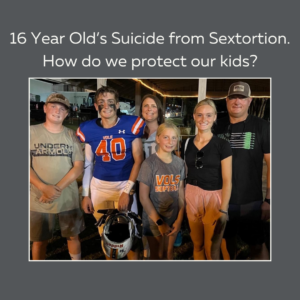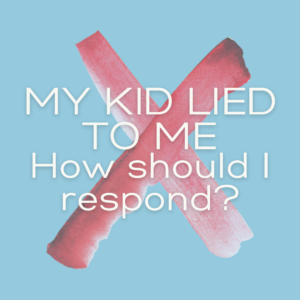0:00:03 – Speaker 1
Hey, this is Mandy and Kim with nextTalk, where we are passionate about keeping kids safe in the digital world.
0:00:09 – Speaker 2
Did you know? we have tens of thousands of listeners in 60 countries. It’s truly amazing, Crazy only God. And, as a non-profit, everything we do at nextTalk is supported by people just like you.
0:00:21 – Speaker 1
Be a part of changing the culture of conversation in your home and around the globe by making a donation today.
0:00:28 – Speaker 2
Go to nextTalk.org and click on Give and check out our resources while you’re there More than cyber parenting conversations to connect.
0:00:37 – Speaker 1
In my newest book, i have a whole section devoted to why we’ve established a no secrets family policy in our home, one of the things I said to my kids when they were little. When I first started on this nextTalk journey and wanted to create a culture of conversation in our home, one of the first little phrases I started saying with my kids was we have no secrets in our family.
0:01:00 – Speaker 2
Yes, we have the same rule in our family too, but before we dive in, we do want to clarify that. When your kids are little, like with us and we implement the saying like this, it’s really important to explain the difference between secrets and surprises, because they’ll wonder why is it okay to have a secret from mommy about her birthday present, but not a secret about something else that we hear at school, and so it’s important to explain the difference. Secrets are something where someone asks you to keep something from mom or dad or says don’t tell them, that’s a secret and it should be a red light in your brain flashing telling you I need to tell mom or dad right away, whereas a surprise is something like a birthday or a present or a special trip. So make sure you explain that difference to them early on, absolutely.
0:01:48 – Speaker 1
But first I want to talk about why we implemented this guideline and why it was important for me, And a lot of it had to do with my research at nextTalk and what I was learning about grooming and online sex trafficking And I was like, oh my gosh, I need a practical thing that can catch this in the beginning stages if this starts happening with my kids.
0:02:10 – Speaker 2
So this is really important, mandy, you know, like you said, sex trafficking and grooming and sexual abuse these are the big things that we’re going to focus on today, and why not having secrets can protect you from things like that, but I think it’s really important that we also say that not having secrets can protect your kids from things that are more everyday and common, like maybe the kid next door who looks at porn or someone who says something on the playground. These are all things that we’re going to probably experience, and so having a rule like this can help save your kid from a lot of different things.
0:02:43 – Speaker 1
Yeah, and that’s why it’s important and why we advocate implementing this in your home. So I do want to focus in today on the grooming and the sex trafficking and all of that and what that looks like. And that can happen in two different ways. It can happen online or in person. So I want to talk first about how This happens online and how a no secrets policy can protect your kids. So say, your kid is playing on the Xbox and they’re communicating with someone whose profile picture and account name seems like a 12 year old kid and they’re just communicating with this person.
Oftentimes, what we see is some sort of grooming and manipulation, to where the kid will start saying my mom gets on my nerves so much she doesn’t understand.
The purpose of that is to get your kid then to vent about you and start saying oh yeah, i totally understand my mom does this.
It’s so annoying, blah, blah, blah.
Right, all the things that we used to say when we were kids about how annoying it’s work right. But I think the difference in the most dangerous situation now is we have this online stranger who really looks and sounds like a 12 year old kid, but could be a 65 year old man who is trying to get your kid in a situation online where they feel like they’re the only people that understand each other, that nobody understands their situation. So it’s almost like this person and your kid is up against the world, up against the parents, up against anybody who’s trying to help. And so if we have a no secrets policy and we are practicing that out every day and our kids are coming home and telling us all the things and we’re not reacting crazy, you know we’re saying thank you for telling me and we’re remaining calm When this happens online we have now created a safe place with our kids where they can come and say this kid online is telling me about how awful his parents are and I’m not quite sure what to do with that.
0:04:53 – Speaker 2
And then it’s our red flag and we understand this could be a grooming situation for our kids, and so you can see how having the no secrets policy helps to stop something from progressing into a really dangerous situation.
Now, mandy and I went a few years back to the National Center on Sexual Exploitation Conference and we learned so much In fact, it was overwhelming because there was so much information about bad things that are happening, but also great organizations who are trying to help change that, and we were there with nextTalk and we found out a lot about grooming and how something like a situation we presented to you can really progress to sharing nudes.
Like if your kid engages in conversation and creates this relationship with this stranger online and they feel like they’ve now gained their trust, they may send them a picture and then ask them to send a picture. They may blackmail them by saying I know where your dad works, or I know your address, or I know what school you go to, and if you don’t send me a picture of you nude, i’m going to tell your dad and send it to them, or I’m going to let them know what you said about them. And if they are able to blackmail your kid, it can progress all the way to them trafficking your child from their bedroom by saying if you don’t take off your clothes from 9 to 11 pm every night and stand in front of the camera, then I’m going to let your parents know what you’ve been saying and doing, and it can happen right under your roof. You see how that can progress from just them trusting an online stranger to this horrible situation of being trafficked in their bedroom.
0:06:28 – Speaker 1
Well, and I think when we think of sex trafficking, we think kidnapped and sold into slavery, which absolutely happens. but I think that’s what was eye-opening with that conference, and one of the things we learned is that kids are being manipulated through these grooming relationships where they’ve kept secrets for so long with this person that now it is like if you don’t do this and so they’re taking off their clothes in front of their computer during these certain hours and their pimp is collecting money from them, but the kids are convinced that if they don’t do that, all of their secrets will be exposed. As we were researching this and learning about this, kim and I were looking at each other like, well, what could we do to prevent this from happening? and it was let’s create a no secrets policy in our home.
0:07:14 – Speaker 2
This is extremely important and if your kid doesn’t have any secrets to expose, that other person, that online stranger, has no power over them.
0:07:24 – Speaker 1
Amen. And another thing that I say to my kids if you ever get in a situation where you have kept a secret from me and then somebody’s asking you to keep a bigger secret again, that’s a red flag alert that should be going off in your brain because they’re trying to trap you into a unhealthy situation. And so, even if you forgot to tell me about the first secret, i’m going to love you the same, but never find yourself in a situation where it’s secret upon secret upon secret trying to get out of a situation. That is a total red flag that you always need mom and dad involved in to help you figure your way out.
0:07:58 – Speaker 2
And I think all of us can recognize, after coming out of COVID and being online so much and kids being on their cameras so much, that kids, more than ever, are looking for connection. This is a prime environment for predators to be pouring into your kid, trying to make a connection so that they can take advantage of them. So these conversations are critical.
0:08:21 – Speaker 1
So that’s kind of how grooming and a no secrets policy can help save your kids from sex traffickers online. That’s an example, And we wanted to kind of lay that out for you so you understood why we’re implementing this in our home. But now I also want to talk about grooming in person and how secrets could protect your kids from a sexual abuse situation. And research does still tell us that sexual abuse can happen among strangers and does, but kids who are physically sexually abused are more likely to be abused by someone they know. So that is a family member, a coach, a pastor, a teacher, somebody that is beloved. That’s living a double life. We see this a lot, And so I want to talk about this type of situation and how secrets can protect your kids from this environment.
0:09:14 – Speaker 2
So when our kids are little, most of us probably did what we did and say things like don’t let anyone touch your private parts, which is good And it’s really important. But kids tend to think about a stranger, or even like a big scary green monster, like when they’re little, like things that are just really, really bad and not normal, and not like the person next door or the coach or the cousin or the aunt or the uncle touching their private parts. So if we’re talking to our kids about strangers touching their private parts, they’re not even prepared for the possibility that it might be someone they know or even love, and then, if it happens, it completely catches them off guard and they don’t know what to do. So it’s very important to explain to your child without scaring them or overexposing them. Someone touching their private parts is not okay, no matter who it is. That has to be clear, so they know that it’s not just going to be a stranger or a big scary monster.
0:10:10 – Speaker 1
And let me explain to you how I know secrets policy can actually catch this grooming happening in person by a beloved family member or individual they know in real life. So let’s just, for example, say a coach drops the F bomb at practice, which happens often in our Texas football world Right, but they say the F bomb at practice And they say don’t tell your parents, right? So I want you to think of a scale of zero to 10. In my mind, that’s step one, okay, and we’ve had this happen. And my kids will come home and say, oh my gosh, and I will say thank you so much for telling me. Thank you, let’s move this person from the green light to the yellow light. So if this person asked you to keep another secret, it is a red flag. You need to come home and tell me right away.
Okay, oftentimes, when adults cuss in front of our kids, it is a simple slip And they’re like, oh my gosh, your mom would kill me. And often it’s innocent, right, yeah, but here’s the thing we don’t want to dismiss it. Because if we dismiss it, then what if it’s a real grooming situation And we’ve literally told our kid this is a safe person, but we don’t really know that it’s a safe person. So we have to be careful with this. So, scale of zero to 10, one is F bomb at practice. What if this same coach goes to step two and maybe your kid and coach is waiting after practice for you to pick up your kid and coach says Hey, have you ever had alcohol? I have a beer in my car And I could give you a little taste. But, oh my gosh, you cannot tell your parents Because if you do I will get in big, big trouble.
If your kid keeps that secret from you, it is permission to the groomer. I can do anything with this kid because he’s not talking to his parents. He’s keeping secrets from his parents. So do you see how a no secrets policy could literally protect your kids right there? Because what we see often on this is, as this progresses and as more secrets are kept around four, five and six, we’re seeing nude photos exchange And then by the time we reach 10, it’s physical abuse with your child. Now, the changing of nude photos, that’s still abuse, that’s still crossing the boundary right. But at 10, we have physical abuse happening And it all could have been avoided if we had a no secrets policy in our home, and when our kids came home and told us about a secret that a beloved coach told them, we didn’t dismiss it.
0:12:55 – Speaker 2
This simple policy is a core principle at nextTalk. And when we say creating a culture of open communication is not easy, this is what we’re talking about. It’s simple, but it’s not easy because it requires a shift in your thinking, and teaching your kids about not having secrets is so important to save them from these bigger issues that could be coming their way.
0:13:21 – Speaker 1
Yeah, and I also want to say, kim, as we implement this policy in our home, you’re going to get some crazy stories, absolutely.
0:13:27 – Speaker 2
I kind of want to prepare you for this, yes.
0:13:30 – Speaker 1
One time I had my kindergarten many years ago A long time ago, a long time ago.
I’m old now, but my kindergartner came home my baby, because we started this whole thing with him way earlier than we did my daughter And he was like, oh, my teacher had us take a nap today for 15 minutes. And she told us don’t tell your parents. Well, in my mind I’m thinking, girl, i would have had them nap the whole period. You deserve that. That’s what’s running through my mind, right? And I know this teacher and I love her and I have a personal relationship with her And I think she’s safe. I 99.9% think she’s safe. But I didn’t say that to my kid, right? I used the stoplight analogy. I didn’t want to dismiss the fact that he was telling me a secret, and so I said thank you so much for telling me. Let’s move, mrs So-and-so, from the green light to the yellow light. And that’s kind of how we’ve operated in our home. And because I take everything so seriously, even when I think it’s nothing, it has meant something to my kids.
0:14:33 – Speaker 2
That is so important because if your kids feel like you really listen and take what they say seriously, they will continue to come and talk to you. Now, another thing that we want to talk about here when you implement this no secrets thing, you have got to have a conversation with the grandparents. This is so important because I will tell you and my family gifts and food they’re like flowing like endless rivers from the Grand Grand.
0:14:58 – Speaker 1
I mean it’s just like gift after gift after gift, you know, milk it on it from the Grand.
0:15:04 – Speaker 2
It is just nonstop, no matter what we say.
And so sometimes one of them will say don’t tell mom I bought you this thing or I got you this piece of candy.
And so we had to talk with them and say I know this seems silly, but we have a no secrets policy for this reason And we took the time to explain this entire show that we’re laying out for you so that they understood the why. Because if you just tell them no secrets, they’re just going to think you’re being difficult in controlling their grandparents And that’s not going to go well. You want them to lavish and love your kids, of course, but just changing that little bit of verbiage and explaining to them the why, then you can all be on the same team And that’s how we presented it to our grandparents. Listen, we know you love our kids as much as we do And we need to parent them differently. And you need to grandparent them a little differently because we want to keep them safe in this digital world. We’re all on one team for them. And then they felt included, they understood and they were willing to make that change.
0:16:06 – Speaker 1
Yeah, and I even go a step farther and say listen, if you go over to the grandparents and you have eight popsicles for breakfast, it’s fine, It’s fine. Just tell me, don’t keep the secret from me.
0:16:18 – Speaker 2
And bring me one later.
0:16:20 – Speaker 1
Bring me to the other thing too, kim, i love you know that clause what happens at Grandma’s stays at Grandma’s. I know it seems so innocent, but if we’re really trying to get our kids to tell us everything and then we’re telling them don’t tell your parents what happened at Grandma’s. It’s just confusing, especially to little kids when they can’t discern yet what that means. And so be careful with those clauses.
I’ve even said I feel like this is a community discussion, really amongst churches too. I mean, i’ve been at church youth camp where I’ve heard pastors on the stage say oh my gosh, don’t tell your parents how much sugar you had at camp. And it makes me cringe because I know it’s just sugar. But I’m over here trying to be a next stock family and trying to implement this no secrets policy because I know what it could save my kids from. And it just makes me cringe when other people, without even realizing it, are asking my kids to keep secrets from me. And so the more we can raise awareness about this and have healthy conversations in our churches and our schools with our, with our grandparents, the more I feel like we can do a better job of keeping our kids safe.
0:17:33 – Speaker 2
And last but not least here you know my husband and I we always tell our kids we’re on the same team, like if you ask mom something, you’re really asking mom and dad something, and vice versa. But now that we have boys and a girl, there are some things that the boys want to tell dad, or my daughter wants to tell me, and they feel uncomfortable about telling the other. And you know it’s not that it’s a bad thing. You know how it is. There’s just some things that are more comfortable to talk about with mom or dad.
A lot of people will say what if my daughter or what if my son asked me to not share something with my husband, or vice versa. One thing that we have always said in our house is listen, mom and dad always share stories. We’re on the same page, but that doesn’t mean that we’re going to come and talk to you about it and embarrass you or make you uncomfortable. So, for example, if my son says something to my husband and he’s uncomfortable sharing it with me, my husband will still tell me about it, but I will never bring it up to my son, jokingly or serious, because that’s an important conversation between him and dad, but it’s important for dad and I to be on the same page so we can pray about it, talk through it and know what’s happening with our kid.
0:18:42 – Speaker 1
Well, you have to respect the boundary that your kid has asked for, and I think that’s very critical and I’ve watched this play out with my husband and my 17 year old daughter, and my daughter respects her dad even more knowing that he hasn’t brought this topic up or tried to engage in conversation, because she has said I don’t want to talk to dad about this, and I think it’s a respect thing, showing them respect.
0:19:08 – Speaker 2
And that works the other way too. It shows your kid the respect you have for your spouse and what a healthy marriage looks like with communication in the home.
0:19:18 – Speaker 1
So I hope we’ve given you some reasons as to why we have a no secrets policy. You know the importance of that and then just some practical things that may come up if you implement this in your home.
0:19:31 – Speaker 2
This is one of the many foundational conversations that we have in our homes as nextTalk families. It will help to keep your kids safe.
Transcribed by https://podium.page
Read More







